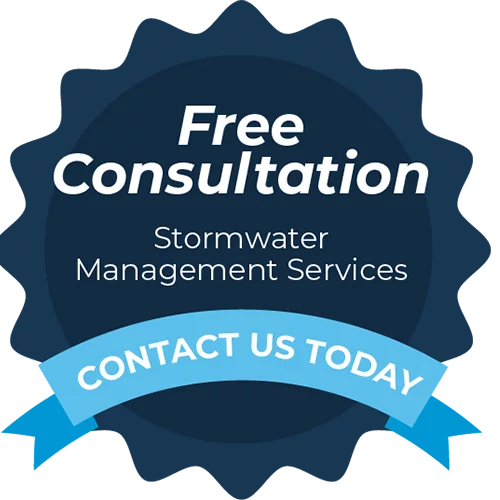Effective stormwater compliance is essential for property managers to protect their assets, avoid penalties, and ensure environmental stewardship. From understanding federal and local regulations to implementing best practices, navigating compliance can feel complex. However, staying informed and proactive can help ensure your property meets all necessary requirements.

Understanding Stormwater Regulations
Stormwater compliance starts with understanding the regulatory framework. In the United States, stormwater management is regulated primarily under the Clean Water Act (CWA), which sets out guidelines for reducing pollutants in stormwater runoff. Property managers must also be familiar with the National Pollutant Discharge Elimination System (NPDES) permit program, which governs the discharge of stormwater runoff into U.S. waters.
In addition to federal regulations, state and local governments may have stricter requirements or additional guidelines for stormwater management. Property managers should consult with local agencies or an experienced stormwater management company to understand specific compliance needs.
Contact iSTORMWATER to discuss your property’s specific stormwater requirements. (410) 231-3455
Common Stormwater Compliance Requirements
Depending on the type and size of your property, stormwater compliance may require various measures, including:
Stormwater Pollution Prevention Plans (SWPPP)
A SWPPP outlines strategies to prevent pollution from stormwater runoff. It typically includes site assessments, identifying pollution sources, and implementing best practices to reduce pollutants.
Erosion and Sediment Control Measures
Construction sites and properties undergoing renovations often require erosion and sediment control measures to prevent soil erosion, which can lead to increased sediment in runoff. Techniques such as hydroseeding and hydromulching, geotextiles, and native vegetation help stabilize soil and control erosion effectively.
Stormwater Infrastructure Maintenance
Regular inspection and maintenance of stormwater systems, like catch basins, detention ponds, bio retention systems, and stormwater filtration systems are critical to compliance. Neglected systems can lead to blockages, water pollution, and penalties. Partnering with a stormwater maintenance provider ensures that systems are kept in optimal working condition.
Consequences of Non-Compliance
Failing to adhere to stormwater regulations can lead to substantial consequences, including:
- Fines and Legal Penalties: Property owners who fail to maintain compliance may face significant fines and legal penalties, especially if the violation leads to environmental damage.
- Environmental Impact: Polluted runoff from non-compliant properties can harm local waterways, affecting wildlife and contributing to broader ecological issues. Non-compliance not only affects the property, but also has long-term environmental ramifications.
- Property Damage and Repair Costs: Ineffective stormwater management can lead to flooding, soil erosion, and water damage on the property. These issues not only threaten the integrity of the property but also lead to costly repairs.
Best Practices for Stormwater Compliance
Ensuring compliance is an ongoing effort. Here are a few best practices for property managers to consider:
- Conduct Regular Inspections: Regular inspections help identify issues early on, whether it’s erosion on slopes, clogged storm drains, or deteriorating infrastructure. Identifying these problems early can help avoid non-compliance and reduce repair costs.
- Work With an Experienced Stormwater Management Company: A knowledgeable, experienced stormwater management company can provide expert guidance, from creating SWPPPs to overseeing system maintenance and repairs. Their knowledge of both the technical and regulatory aspects can ensure your property remains compliant.
- Implement Sustainable Landscaping Solutions: Strategies like rain gardens, permeable pavements, and native vegetation reduce runoff and naturally filter pollutants. Not only do these practices enhance compliance, but they also improve the property’s aesthetics and sustainability.
- Stay Updated on Regulatory Changes: Stormwater regulations can evolve as new environmental challenges arise. A stormwater compliance partner can help keep you informed of any changes that impact your property.
How iSTORMWATER Can Help
With years of experience in stormwater management and a dedicated stormwater engineer on staff, iSTORMWATER can guide property managers, owners, HOAs, and more through every step of stormwater compliance. From erosion control services to routine maintenance, we provide comprehensive solutions tailored to your property’s specific needs. We’ll help you understand your regulatory requirements and create a plan that prioritizes both compliance and environmental protection.
Ensuring stormwater compliance doesn’t have to be a burden. With the right information and a proactive approach, property managers can protect their properties, support the environment, and avoid costly penalties. Contact iSTORMWATER today to learn more about our compliance solutions and how we can support your property.
Real Results
iStormwater LLC was an excellent choice. They made the process of the Stormwater pond repairs seamless. They took charge of the project and got the project approved and passing the inspection. We highly recommend them and would use them again.
Incredible stormwater management service. The owner John consulted on a property I manage and ended up saving us thousands of dollars in environmental fees from the government. Now, our property is compliant with the EPA and we have a great partner to keep us maintained on stormwater regulations over time.
So helpful with all of my water issues.
Great communication and leadership and a family friendly atmosphere. Thank you John!
Stormwater systems are designed to manage runoff, protect downstream waterways, and maintain regulatory compliance. But no matter how advanced the treatment practice, its long-term performance...
- Annapolis
- Anne Arundel County
- Baltimore County
- Baltimore
- Bel Air South
- Bethesda
- Bowie
- Cecil County
- Charles County
- Columbia
- Gaithersburg
- Glen Burnie
- Howard County
- Montgomery County
- Pasadena
- Prince George’s County
- Rockville
- Severna Park
- St. Mary’s County



